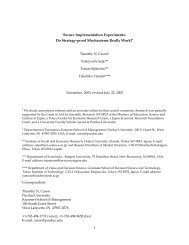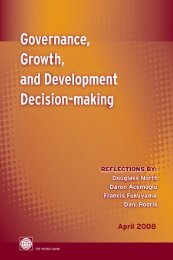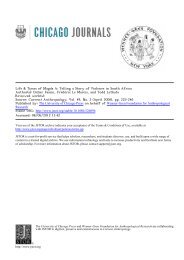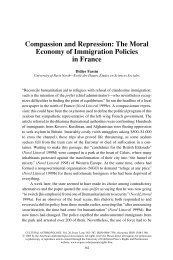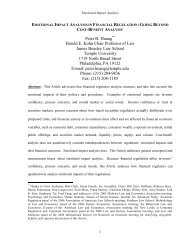The Tools of the Master Slavery and Empire in Nineteenth Century ...
The Tools of the Master Slavery and Empire in Nineteenth Century ...
The Tools of the Master Slavery and Empire in Nineteenth Century ...
You also want an ePaper? Increase the reach of your titles
YUMPU automatically turns print PDFs into web optimized ePapers that Google loves.
8 THE TOOLS OF THE MASTER<br />
Society <strong>and</strong> were repr<strong>in</strong>ted <strong>in</strong> newspapers, giv<strong>in</strong>g readers opportunities to view <strong>the</strong> human<br />
faces <strong>of</strong> slavery.<br />
It was a tremendous <strong>and</strong> very evocative human rights campaign <strong>and</strong> it helped to shape<br />
<strong>the</strong> view <strong>of</strong> Africa for much <strong>of</strong> <strong>the</strong> British public. Many people ga<strong>in</strong>ed what little <strong>the</strong>y knew<br />
about Africans from <strong>the</strong> writ<strong>in</strong>gs <strong>of</strong> Dr. David Liv<strong>in</strong>gstone, <strong>the</strong> explorer <strong>and</strong> missionary who<br />
so carefully <strong>and</strong> passionately related his experience <strong>of</strong> <strong>the</strong> slave trade <strong>and</strong> thus contributed<br />
pr<strong>of</strong>oundly to <strong>the</strong> Anti-<strong>Slavery</strong> Society’s campaign <strong>in</strong> East Africa. 19<br />
Dr. Liv<strong>in</strong>gstone was<br />
deeply outraged by <strong>the</strong> slave trade; he doucmented example after example <strong>of</strong> <strong>the</strong> suffer<strong>in</strong>g<br />
<strong>the</strong> trade caused to Africans. In his last diaries, he described how African slaves <strong>of</strong>ten so<br />
affected him that he felt himself a part <strong>of</strong> <strong>the</strong>ir lives. Take this <strong>in</strong>terest<strong>in</strong>g passage which he<br />
wrote <strong>in</strong> Zanzibar:<br />
On visit<strong>in</strong>g <strong>the</strong> slave-market, I found about three hundred slaves exposed<br />
for sale, <strong>the</strong> greater part <strong>of</strong> whom came from <strong>the</strong> Lake Nyassa <strong>and</strong> <strong>the</strong> Shire<br />
River; I am so familiar with <strong>the</strong> peculiar faces <strong>and</strong> mark<strong>in</strong>gs or tattoo<strong>in</strong>gs,<br />
that I expect <strong>the</strong>m to recognize me. 20<br />
Us<strong>in</strong>g his position as a foreigner, Dr. Liv<strong>in</strong>gstone <strong>of</strong>ten did try to <strong>in</strong>tercede, to rescue or to<br />
buy <strong>the</strong> freedom <strong>of</strong> as many slaves as he could. In his writ<strong>in</strong>gs, slaves became an archetype<br />
<strong>of</strong> victimization <strong>and</strong>, as <strong>the</strong> above quote shows, he considered himself an archetype <strong>of</strong> <strong>the</strong>ir<br />
salvation. He went so far as to imply that no one before him had tried to help <strong>the</strong>m or to<br />
free <strong>the</strong>m. He pa<strong>in</strong>ted <strong>in</strong> detail a terrify<strong>in</strong>g world <strong>in</strong> which he envisioned <strong>the</strong> slaves liv<strong>in</strong>g,<br />
where Arabs <strong>and</strong> Muslims alternatively become <strong>the</strong> personification <strong>of</strong> evil: barbaric slaveraid<strong>in</strong>g<br />
villa<strong>in</strong>s.<br />
Liv<strong>in</strong>gstone was unimpressed with arguments that Islam had brought greater knowledge<br />
<strong>and</strong> civilization to eastern <strong>and</strong> central Africa. He was struck by what he considered an<br />
absence <strong>of</strong> Muslim missionary activity among <strong>the</strong> pagan Africans, <strong>and</strong> wondered at <strong>the</strong><br />
missed opportunity this lack <strong>of</strong> proselytiz<strong>in</strong>g created. He wrote <strong>in</strong> his diary: “As <strong>the</strong>y [<strong>the</strong><br />
Arabs] never translate <strong>the</strong> Koran, <strong>the</strong>y neglect <strong>the</strong> best means <strong>of</strong> <strong>in</strong>fluenc<strong>in</strong>g <strong>the</strong> Africans,<br />
who <strong>in</strong>variably wish to underst<strong>and</strong> what <strong>the</strong>y are about.” 21 Liv<strong>in</strong>gstone reasoned that Islam<br />
had only atta<strong>in</strong>ed a superficial <strong>in</strong>fluence among <strong>the</strong> natives <strong>of</strong> Africa, <strong>and</strong> that <strong>the</strong>ir religious<br />
practices <strong>in</strong> mosques were pantomime, or as he put it “a dumb show.”<br />
<strong>The</strong>se ideas ga<strong>in</strong>ed widespread currency <strong>in</strong> Engl<strong>and</strong>. For <strong>the</strong> newspaper-read<strong>in</strong>g public<br />
<strong>in</strong> both Europe <strong>and</strong> <strong>in</strong> Egypt, for visitors to <strong>the</strong> free lectures at Geographic Societies, or for<br />
strollers through <strong>the</strong> exotic panoramas <strong>of</strong> <strong>in</strong>ternational World Exhibitions, Central <strong>and</strong> East<br />
African territories un<strong>of</strong>ficially bore <strong>the</strong> impr<strong>in</strong>t <strong>of</strong> Dr. Liv<strong>in</strong>gstone’s illustrious name <strong>and</strong><br />
reputation. 22 <strong>The</strong> name <strong>of</strong> Sir Samuel Baker clung to <strong>the</strong> upper regions <strong>of</strong> <strong>the</strong> Blue Nile,<br />
even while he ceremoniously affixed that <strong>of</strong> his monarch to Lake Albert Nyanza. In direct<br />
contrast to <strong>the</strong> monumentalization <strong>of</strong> <strong>the</strong>se European <strong>and</strong> British men as explorers <strong>and</strong><br />
liberators <strong>of</strong> Africa, Egyptian or Muslim leaders whose names were connected to sub-<br />
Saharan Africa were almost always implicated as agents <strong>of</strong> <strong>the</strong> slave trade.<br />
<strong>The</strong> primary accuser was <strong>the</strong> aggressive Anti-<strong>Slavery</strong> Society <strong>of</strong> London which took full<br />
advantage <strong>of</strong> its political clout to lobby for particular British policies <strong>in</strong> Egypt <strong>and</strong> East<br />
Africa. 23<br />
<strong>The</strong> Society’s <strong>in</strong>fluence eventually reached so far that it felt itself able to pressure<br />
<strong>and</strong> petition <strong>the</strong> Khedive Isma’il directly when it learned <strong>of</strong> his plans to exp<strong>and</strong> Egyptian<br />
<strong>in</strong>fluence along <strong>the</strong> Nile. Isma’il was a ruler whose goals <strong>of</strong> rais<strong>in</strong>g Egypt to <strong>the</strong> level <strong>of</strong><br />
Europe were well-known. <strong>The</strong> Anti-<strong>Slavery</strong> Society was thus <strong>in</strong> a position to aim its words<br />
effectively. <strong>The</strong>y praised <strong>the</strong> Khedive for statements he had made aga<strong>in</strong>st <strong>the</strong> slave trade <strong>in</strong><br />
1867, but questioned <strong>the</strong> lack <strong>of</strong> movement towards <strong>the</strong> abolition <strong>of</strong> <strong>the</strong> <strong>in</strong>stitution s<strong>in</strong>ce



